Many were Rohingya who fled Burma (Myanmar) and arrived in the region suffering the effects of malnutrition and abuse during the journey.
Several hundred people were also intercepted on boats heading to Australia.
The report was produced by UNHCR's Bangkok-based Maritime Movements Monitoring Unit, which collates information through interviews, and from media reports, partners and governments.
It focuses on departures from the Bay of Bengal and elsewhere passing through Southeast Asia, and highlights the abuses people are facing on their journeys, and developments related to Australia's Operation Sovereign Borders policy.
It also shows that more than 7000 asylum-seekers and refugees who have travelled by sea are at present held in detention facilities in the region, including over 5000 in Australia or its offshore processing centres in Nauru and Papua New Guinea.
Because of its clandestine nature, the extent of people smuggling remains hard to determine. But interviews with survivors have offered insights into what goes on during the long and arduous journey from Myanmar and Bangladesh to Thailand, Malaysia, Indonesia, and beyond.
The report estimates that 53,000 people departed irregularly by sea from the Bay of Bengal in the 12 months ending June 2014 - a 61 percent increase over the previous 12 months.
In the two years following the June 2012 outbreak of inter-communal violence in Myanmar's Rakhine state, some 87,000 people - mostly Rohingya but also Bangladeshis - embarked on the dangerous journey in search of safety and stability.
The main sailing season has continued to be between October and the first quarter of the year when seas are calmer.
Departures were mostly from Teknaf in Bangladesh and Maungdaw in Myanmar, with smaller numbers from Sittwe. Typically, passengers were ferried on small boats to larger fishing or cargo boats that could each hold up to 700 people.
Most were men, but there were also rising numbers of women and children.
Most passengers interviewed said they paid between US$50 and US$300 to board the boats and were at sea for an average of one to two weeks.
Some waited for up to two months for their boat to take on more passengers. Many said they fell sick along the way. There are also unconfirmed reports of deaths due to illness, heat, a lack of food and water and severe beatings.
In Thailand, the survivors of sea journeys said they were packed into pick-up trucks at night, and forced to sit or lie on top of up to 20 other people.
They were taken to smugglers' camps in or around hills, jungles or plantations. Hundreds were confined, for up to six months, behind wooden fences with only plastic sheets to sleep on.
Many were unaware that they would need to pay more money, usually US$1500-US$2200, to be released.
They were made to call relatives in Myanmar, Bangladesh or Malaysia to send money through hard currency, bank transfers or mobile payment systems. Those who could not pay would be beaten and detained for long periods of time.
Survivors of this ordeal told UNHCR staff about people dying in these smugglers' camps due to illness or physical injuries. Some lost sensory abilities and mobility from beriberi due to malnutrition, specifically Vitamin B1 deficiency.
As of early July, 233 Rohingya remained in Thai detention centres or shelters.
UNHCR is discussing alternatives to detention with government counterparts and other stakeholders. UNHCR is providing aid and working with the authorities and UNICEF to enable the children to attend local schools.
In Malaysia, UNHCR has had access to 230 people who arrived directly by boat between January and June, as well as to others who landed by boat in Thailand and made their way across the land border into Malaysia.
In total, more than 4700 Rohingya were registered during this period, including 375 unaccompanied and separated children. Since the late 1990s, some 38,000 Rohingya have registered with UNHCR Malaysia.
The health and protection needs of recent arrivals remain a major concern, with many showing signs of beriberi.
In Indonesia, 60 Rohingya approached UNHCR in Indonesia between January and June - a drop of almost 90 percent compared to the same period last year.
By the end of June 2014, there were 951 Rohingya registered with UNHCR, mainly people who arrived in previous years from Malaysia.
In the first half of the year, nine boats travelling towards Australia with more than 400 people were intercepted under the government's Operation Sovereign Borders. Seven were returned to Indonesia.
One boat with 41 passengers was returned to Sri Lanka. The 157 people on board another boat that left from India were transferred to Nauru, pending a decision by the Australian High Court on how to process them.
All these developments take place in the context of a very challenging protection environment for refugees in the region.
States, including Thailand, Malaysia and Indonesia, are not signatory to the 1951 Refugee Convention and lack formal legal frameworks for dealing with refugees.
Without a legal status they are often at risk of arrest, detention, and deportation under immigration laws. It also makes legal employment impossible and drives many people, including women and children, into exploitative and vulnerable situations.
The report 'South-East Asia: Irregular Maritime Movements January-June 2014' is available at www.unhcr.org/53f1c5fc9.html
unhcr.org
Over 20,000 people risked their lives in sea crossings in the Indian Ocean in the first half of this year, many of them Rohingya who fled Myanmar, according to a new report released today by the United Nations refugee agency.
The report by the UN High Commissioner for Refugees (UNHCR) on irregular maritime movements in South-east Asia also notes that several hundred people were intercepted on boats heading to Australia.
Produced by a newly-established Maritime Movements Monitoring Unit at UNHCR's Regional Office in Bangkok, the report focuses on departures from the Bay of Bengal and elsewhere passing through South-east Asia, and highlights the abuses people are facing on their journeys, and developments related to Australia's Operation Sovereign Borders policy.
It shows that more than 7000 asylum-seekers and refugees who have travelled by sea are at present held in detention facilities in the region, including over 5000 in Australia or its offshore processing centres in Nauru and Papua New Guinea.
''Because of its clandestine nature, the full extent of people smuggling remains hard to determine,'' UNHCR spokesperson Adrian Edwards told reporters in Geneva.
''But in-depth interviews with survivors have offered insights into what goes on during the long and arduous journey from Myanmar and Bangladesh to Thailand, Malaysia, Indonesia, and beyond.''
The report estimates that 53,000 people departed irregularly by sea from the Bay of Bengal in the 12 months ending June 2014 - a 61 percent increase over the previous 12 months. In the two years following the June 2012 outbreak of inter-communal violence in Myanmar's Rakhine state, some 87,000 people - mostly Rohingya but also Bangladeshis - embarked on the dangerous journey in search of safety and stability.
The main sailing season has continued to be between October and the first quarter of the year when seas are calmer. Typically, passengers were ferried on small boats to larger fishing or cargo boats that could each hold up to 700 people. Most were men, but there were also rising numbers of women and children.
According to the research, most passengers interviewed said they paid between $50 and $300 to board the boats and were at sea for an average of one to two weeks. Some waited for up to two months for their boat to take on more passengers.
Many said they fell sick along the way. There are also unconfirmed reports of deaths due to illness, heat, a lack of food and water and severe beatings.
UNHCR cited ''a very challenging protection environment'' for refugees in the region. States, including Thailand, Malaysia and Indonesia, are not signatories to the 1951 Refugee Convention and lack formal legal frameworks for dealing with refugees.
''Without a legal status they are often at risk of arrest, detention, and deportation under immigration laws,'' said Mr Edwards. ''It also makes legal employment impossible and drives many people, including women and children, into exploitative and vulnerable situations.''

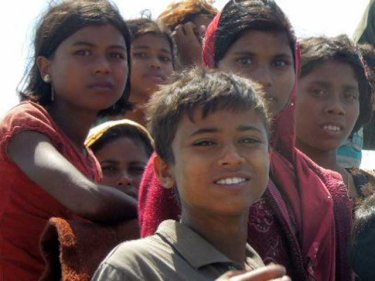





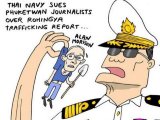

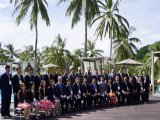







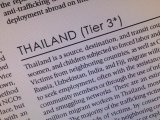

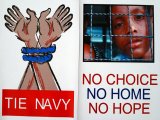
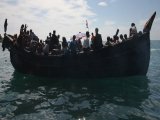
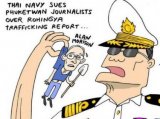
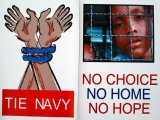
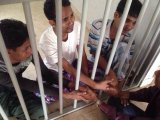





"A new UNHCR report ... estimates that 20,000 people risked their lives in sea crossings in the first half of this year."
Could the Navy please explain how this is possible while they are patrolling these waters ?
Posted by James on August 24, 2014 11:14